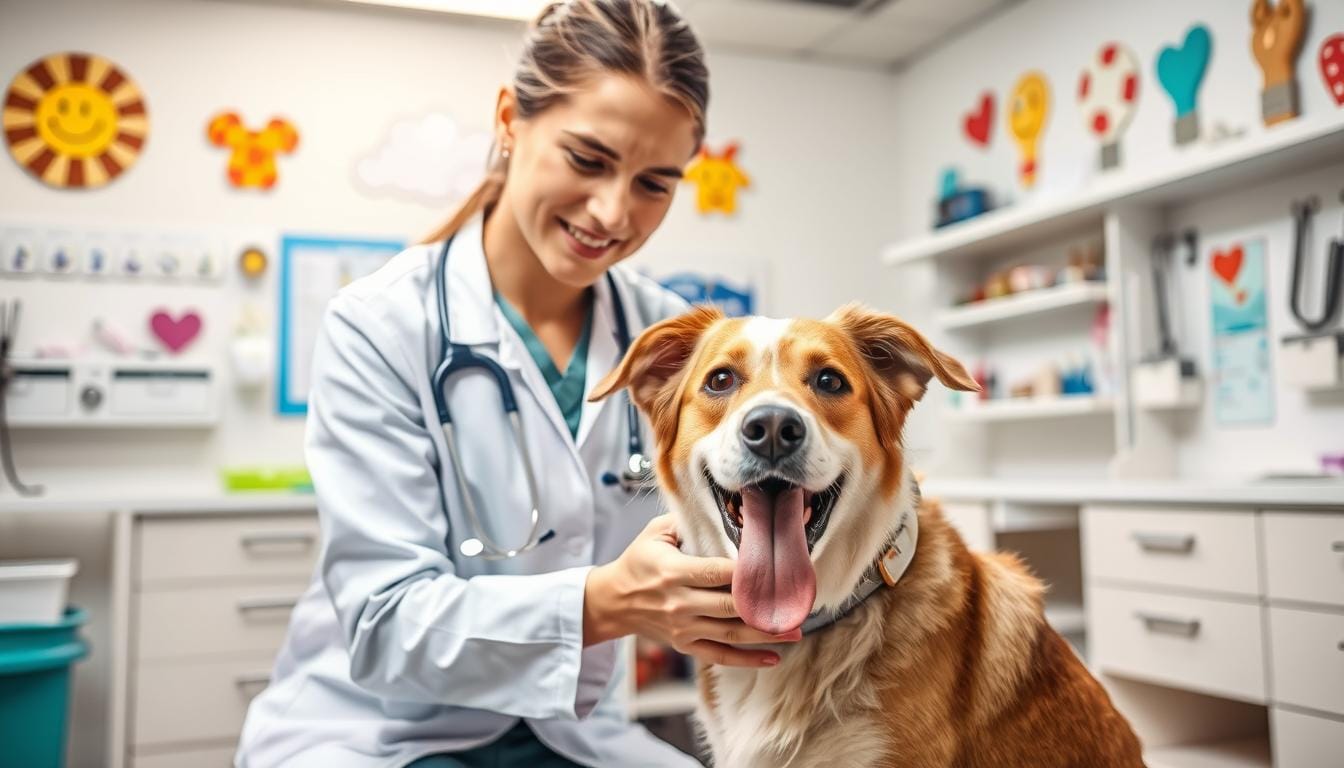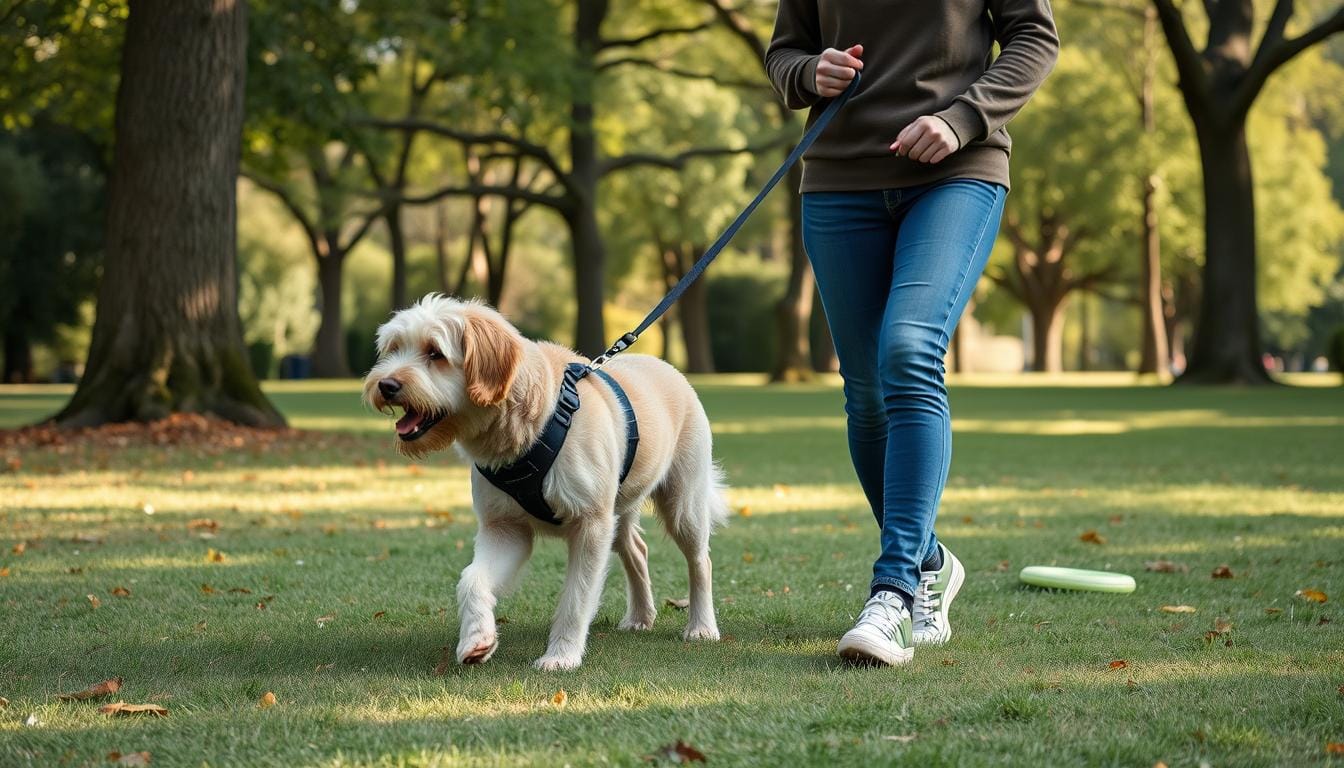Regular health check-ups are important for us, but what about our pets? Regular vet check-ups are key for keeping your dog healthy and happy. These visits are crucial for preventive care and greatly improve your pet’s life.
Pet wellness is more than just fixing problems as they come up. It’s about staying ahead of health issues. By taking your dog for regular vet visits, you can spot early signs of illness. This early action can lead to better treatments, better health outcomes, and even save money.
Vets suggest annual exams for most dogs. Puppies, seniors, and dogs with health issues need more frequent visits. These check-ups include physical exams, shots, and care plans made just for your dog.
Key Takeaways
- Regular vet check-ups are essential for maintaining your dog’s health
- Preventive care can lead to early detection and treatment of health issues
- Annual exams are recommended for most dogs, with more frequent visits for puppies and seniors
- Routine check-ups include physical exams, vaccinations, and preventive care measures
- Proactive pet wellness can result in better health outcomes and potential cost savings
Understanding the Value of Preventive Veterinary Care
Preventive veterinary care is key to keeping your dog healthy. Regular pet wellness exams are at the heart of this care. They offer many benefits for your dog’s health.
Building a Foundation for Lifelong Health
Starting with preventive care is a smart move for a healthy life. Wellness plans, starting at about $10 a month, include routine checks, shots, and parasite control. These plans fit your pet’s needs and health history.
The Role of Early Detection in Pet Wellness
Regular vet visits are vital for catching diseases early. Dogs often hide signs of illness. So, regular vet visits are a must.
Early detection means better and cheaper treatments. For older dogs over 7, seeing the vet twice a year is a good idea. This is because they face more health risks.
Cost Benefits of Preventive Care vs Emergency Treatment
Preventive care is much cheaper than emergency treatments. For example:
- Spaying costs a few hundred dollars but prevents uterine infections that can cost over $1000 to treat.
- Parvovirus vaccine series costs $50-$100, while treatment can exceed $1000.
- Pet insurance covering preventive care can help manage costs and ensure better health outcomes.
By focusing on preventive care, we save money and ensure our dogs live happier, healthier lives.
Regular Vet Check-ups, Dog Health, Preventive Care, Pet Wellness
Regular vet visits are key to keeping your dog healthy. Pet wellness exams help find problems early. This keeps your furry friend healthy for life.
Core Components of Wellness Examinations
Canine health screenings include important parts. These exams check for any issues or illness. Blood tests, like Complete Blood Count (CBC) and Biochemistry Profile, check organ function and for infections.

Frequency Recommendations by Life Stage
Vet visits change with your dog’s age and health. Puppies need visits every 3 to 4 weeks from 6-8 weeks old until 16-20 weeks. Adult dogs need yearly exams. Senior pets should see the vet every 6 months, starting at 7 years old for medium-sized dogs.
Establishing Health Baselines
Regular exams set health baselines for your dog. These baselines help spot changes in your pet’s health. Tests like heartworm checks, fecal exams, and blood pressure measurements are crucial. They help vets catch and treat health issues early.
| Test | Purpose | Frequency |
|---|---|---|
| Heartworm Test | Check for heartworm infection | Yearly |
| Fecal Exam | Check for parasites and GI issues | Regularly for puppies |
| Blood Pressure | Detect hypertension or hypotension | During senior wellness screenings |
By focusing on regular vet visits and preventive care, we can help our dogs live better lives. Early detection and prevention are crucial for managing your pet’s health over time.
Why Dogs Excel at Hiding Health Problems
Dogs have a special way to hide signs of illness. This makes it hard for us to notice early. Regular vet visits are key to catching health issues before they get worse.
Studies reveal that we can spot signs of pain in dogs. Look for physical signs like trouble moving, shaking, or not wanting to eat. Behavioral changes include acting restless, tired, or sleeping differently.
Dogs show pain through sounds like grunting or whining. They might hide instead of coming to us. So, it’s up to us to watch for these signs and act fast.
“Half of the pets owned by our valued customers are elderly, making regular health checks even more critical.” – Small Pet Select
Here are some tips to help detect diseases early:
- Do monthly health checks at home
- Watch for weight changes
- Look for unusual growths or irritations during grooming
- Check eyes, ears, and nose for any issues
- Keep a record of any symptoms
By understanding how dogs behave and going for regular vet visits, we can help them hide their health problems less. This ensures they stay healthy and happy.
| Behavior | Possible Health Concern |
|---|---|
| Excessive licking | Allergies or pain |
| Changes in sleep patterns | Discomfort or illness |
| Loss of appetite | Digestive issues or dental problems |
| Increased vocalization | Pain or distress |
Essential Health Screenings During Veterinary Visits
Regular health checks are key to keeping your dog healthy. These exams usually happen once a year. They include detailed checks to make sure your dog stays in top shape.
Physical Examination Elements
Vets do a full physical check during these exams. They look at your dog’s eyes, ears, mouth, neck, chest, and belly. This helps find any problems early.

Diagnostic Testing Options
These exams also include various tests. Blood work, urine tests, and stool exams are common. They can spot issues like diabetes, thyroid problems, anemia, and heartworms before symptoms show.
Vital Signs Assessment
Checking vital signs is a big part of these exams. Vets measure heart rate, breathing rate, and body temperature. These signs tell a lot about your dog’s health.
| Exam Component | Frequency | Duration |
|---|---|---|
| Physical Examination | Annually | 15-30 minutes |
| Diagnostic Tests | As needed | Varies |
| Vital Signs Check | Every visit | 5-10 minutes |
The need for these exams can change. It depends on your dog’s age, breed, and health. Puppies and older dogs might need more visits to keep up with their health.
Vaccination Schedules and Preventive Medications
Keeping your dog healthy is more than just regular vet visits. It’s also about keeping up with vaccine updates and preventing parasites. We’ll look at how to protect your pet with the right vaccinations and medications.
Core and Non-Core Vaccines
Core vaccines are a must for all dogs. They protect against serious diseases like rabies and distemper. Non-core vaccines depend on your dog’s lifestyle and risks. Your vet will decide which ones your pet needs.
Parasite Prevention Protocols
Keeping your dog free from parasites is vital. This includes fighting off fleas, ticks, and heartworms. The best plan depends on where you live and your dog’s risks.
Customizing Prevention Plans
Every dog is different, and so should their prevention plan. We can create a plan that matches your dog’s age, health, and lifestyle. This way, your pet gets the right protection without extra treatments.
| Plan | Monthly Cost | Wellness Exam | Microchip | Teeth Cleaning | Total Yearly Benefit |
|---|---|---|---|---|---|
| Defender | $15 | $50 | $20 | $0 | $305 |
| DefenderPlus | $28 | $50 | $40 | $150 | $535 |
Choosing the right preventive care plan can save you up to 35% on vet costs. Remember, investing in prevention now can save you from expensive treatments later.
The Role of Dental Care in Overall Health
Pet dental care is key for dogs’ health. By age three, most dogs have periodontal disease. This common dental issue often goes unnoticed by owners.
Regular dental check-ups are vital for your dog’s teeth. Vets rate dental health from 0 (normal) to 4 (severe). They clean under anesthesia, reaching areas where problems start.
Ignoring dental care can harm your dog’s health. Bacteria from gum infections can reach the heart, liver, and kidneys. This shows why dental care is crucial for your pet’s health.
“Preventive dental care is key to ensuring a healthy smile for pets throughout their lives.”
At home, brushing your dog’s teeth daily is best. Dental chews, wipes, and water additives can also help.
| Age | Dental Care Needs | Recommended Actions |
|---|---|---|
| Puppy | Establish good habits | Introduce tooth brushing, dental chews |
| Adult | Maintain oral health | Regular brushing, annual dental check-ups |
| Senior | Increased risk of dental issues | Bi-annual check-ups, possible extractions |
Pet dental care is an investment in your dog’s health. Regular dental visits and home care are crucial. They help keep your pet healthy and happy for years.
Age-Specific Health Considerations
Dogs have unique health needs at different life stages. We’ll explore how to care for your furry friend from puppyhood to their golden years.
Puppy Wellness Programs
Puppy wellness is crucial for a healthy start. Monthly vet visits are recommended for puppies under 12 months. These checkups focus on vaccinations, parasite prevention, and establishing good health habits. Spaying or neutering is typically advised between 6-12 months of age.
Adult Dog Health Maintenance
For adult dogs aged 1-7 years, yearly vet checkups are standard. These visits include annual wellness exams, preventive care, and addressing any emerging health issues. Regular screenings like heartworm tests, fecal exams, and blood work help detect potential problems early.
Senior Dog Special Needs
Senior pet care requires extra attention. Dogs over 7 years (or large breeds over 5) should visit the vet every 6 months. These checkups may include:
- Blood tests and urinalysis to detect early signs of diseases like kidney issues or diabetes
- Blood pressure measurements to check for hypertension
- Specialized diets and management of age-related conditions like arthritis
Regular vet visits throughout your dog’s life stages are key to maintaining their health and happiness. By following these guidelines, we can ensure our furry companions receive the best care possible at every age.
Common Health Issues Detected During Check-ups
Regular vet check-ups are key for early disease detection and pet wellness. These visits help vets spot health issues early. This ensures our pets live healthier lives.
Early Warning Signs
Vets look for small changes during wellness exams. They check vital signs and perform physical exams. They might also suggest blood tests or urinalysis.
These screenings can show early signs of diabetes, kidney disease, or thyroid disorders. Dogs are good at hiding illness. So, regular check-ups are vital, even if they seem healthy.
Chronic Disease Management
Wellness testing is more important for middle-aged and senior dogs. Semi-annual check-ups are advised for older pets. They are more likely to get chronic conditions.
Early detection of issues like arthritis or heart disease is crucial. Vets can create treatment plans to improve your dog’s life. This helps slow down disease progression.
Emergency Prevention Strategies
Check-ups are not just for treating issues; they prevent emergencies too. Vets can spot risks based on your dog’s breed, age, and lifestyle. They might suggest diet changes, exercise, or preventive meds.
By focusing on pet wellness and early disease detection, we can extend our pets’ lives. They can live longer, happier lives.
















